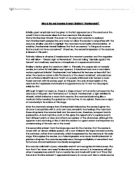Walton’s ambitions are a mirror of Frankenstein’s and we see two characters who have become obsessed with the pursuit of knowledge believing that they are doing it for the good of mankind rather than any material wealth. Walton’s ‘insanity’ being mirrored by Frankenstein being ‘deeply smitten with the thirst for knowledge’.
Frankenstein’s family are seen as a benevolent group of people. His first memories are of his ‘mothers soft caresses and his father’s smile of benevolent pleasure.
However we soon see that these benevolent people are not typical of all the characters in the novel. Instead we see Justine put to death for a murder she did not commit and forced to confess by a corrupt church.
Shelley uses a ‘framed’ multiple narrative form to enable the reader to obtain different perspectives. However because they are ‘framed’ we may be seeing a less reliable version. We see Frankenstein’s narration as written in Walton’s journal and therefore it may be coloured by Walton’s own views. The creature’s narration is reported by Frankenstein before being recorded in Walton’s journal and this could add another layer of distortion. However, Shelley uses highly rhetorical language to show the creatures eloquence. His view of mankind brought about by his reading of books such as ‘Paradise Lost’ and Plutarch’s ‘Lives’ and his observations of the DeLaceys enable him to build up a picture of a society based on a class system and because he does not have material wealth and the because of his appearance he recognises that he will be ranked the lowest of all.
Through the creature we see the concept of alienation developed. To Shelley, mankind will alienate anyone who does not fit into the norm. Another example of this is Frankenstein’s rejection of M. Kempe who he dislikes partly because of his unattractive appearance. DeLacey senior is quite happy to make the acquaintance of the creature because he is unable to see him, however when the rest of the family arrive they quickly drive him away. Before this Frankenstein had himself rejected ‘his creature’ stating ‘breathless horror and disgust filled my heart’.
It could be argued by using the gothic imagery Shelley has built up an unpleasant picture of the creature and that really
Shelley has thus shown that she considers that it is unacceptable for people to be alienated because they are different. She shows the injustice of the creature’s constant rejection by mankind – rejection by the shepherd, the villages, the DeLaceys and the friends of the young girl he saved from drowning. The creature initially exhibited a benevolent nature and in his own words: ‘I was benevolent and good; misery made me a fiend.’
Thus we see that he was demonstrating the characteristics that Shelley would have come across from her reading of Rousseau’s books – the view that man is born good but society corrupts him. Her father also believed in a ‘universal benevolence’ which we need in order to have a just and virtuous society one where we care for each other and in particular the less fortunate.
Consequently we can see that Shelley whilst expressing some of the views of a romantic writer did not see her contempory society in a good light. She expressed problems including a belief in the injustice of the legal system and a failure by people to generally look after each other. Some readers make take this to mean that Shelley saw unsolvable problems in her view of mankind. However it is my belief that she was showing us that there was a way forward if we took responsibility for our own actions and also ensured the welfare of others around us.







